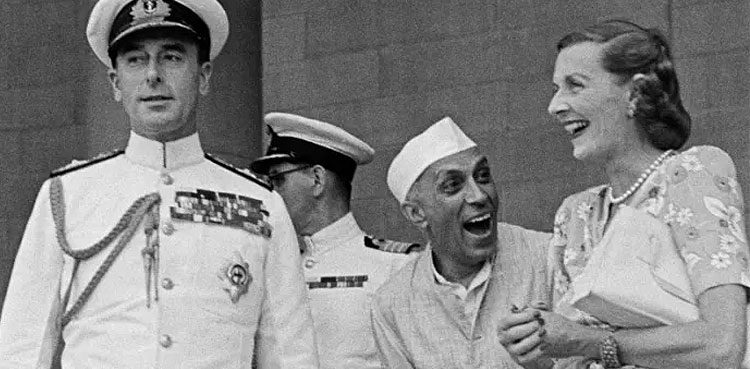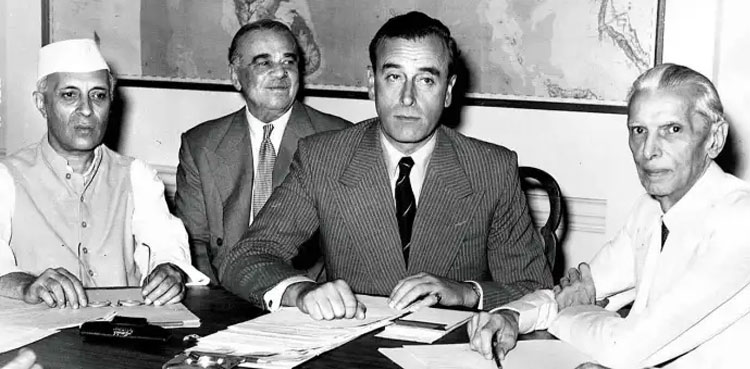The last British viceroy
- By Zoya Ansari -
- Aug 19, 2022

Lord Louis Mountbatten served as the last British viceroy ending the long line of British chief executives that began from 1772 with Warren Hastings being the first of the line.
The office of the British governor general of the subcontinent was taken over by the British Crown and the sobriquet Viceroy was added to his title because he also represented the British royalty.
However, the authority of the office remained constant in the office of the governor general and it was from this office that he derived his executive authority. The viceroy was assisted by an extremely efficient civil service that one British PM Lloyd George termed as the steel frame of the British Empire.
After almost two centuries of British domination, they were compelled to hand over power to the indigenous political parties. For ensuring the end of the British rule they sent Lord Mountbatten to wind it up.
Mountbatten, during his career was widely known as Apprentice Warlord.
His royal connections that he extensively used catapulted him to many decisive positions his intellect and temperament did not suit. His vanity was overbearing and he was well-known to concentrate long on the family-tree he was making despite discharging the onerously hectic responsibility as the last viceroy of India.
He never paid attention to the criticisms offered on his erratic naval career and usually brushed them aside. His naval escapades brought many disasters to the campaigns he was involved in but his connections always saved him.
The Mountbatten family, that changed its original very German name Battenberg under intense anti-German sentiments prevailing in Britain in the wake of the first World War, did have royal blood in their veins and they were very proud of it.
His family had ruled in the small principality of Germany named Hesse.
His grandfather eloped with a Polish girl of humble origins thereby getting relegated to a very low status in royalty but joined Austrian army and rose to become a general.

He fathered five children and one of them Prince Louis who joined British Navy married a grand-daughter of Queen Victoria and rose to the highest position in Royal Navy as Admiral-of-the Fleet.
Mountbatten was born in London in 1900 and like his father joined British Navy. He saw the humiliation of his father who was obliged to resign his commission owing to his German ancestry.
The young Mountbatten also known as Louis after his father however turned out to be very controversial figure. It was widely known that Mountbatten’s private life was defined by romances of all sorts. Talking about sex in open was not an anomaly to him and he took kick out of pornography as was widely reported to have cherished his status as the most sought after man.
Though he was welcomed in every company but he married money as Edwina Ashley was a very rich heiress. She was equally a bohemian and her extramarital affairs matched her husbands’ and soon her reputation overtook him.
It was an odd couple by any definition and Mountbatten sacrificed his masculine honour on the altar of ready money Edwina provided. Although Mountbatten lived a royal life, decorated with all the facilities that a royal blood normally enjoys, yet the abundant luxuries became available to him only after he married Edwina.
Edwina inherited a large fortune plus properties from her grandfather. Edwina’s fortune helped crystallise all the sexual fantasies of her husband. It is remarkable that Mountbatten always evaded tax whenever he found the opportunity to do so. She dominated him to the extent that it was very rare that he openly advocated his ideas before she ripped them apart.
The inner weakness of Mountbatten kept him holding on to her highly scandalous life that reached climax when she was warned by the Queen to hold her indiscretions in check when she was known to be having an affair with a black artist.
Mountbatten’s naval career however progressed well and he developed a marked tendency for signals system of British navy. His attention to detail soon earned him respect but his seniors were never convinced of his leading capabilities.
Mountbatten’s’ star rose when Churchill took over as Prime Minister in 1940and started guiding the war effort. Churchill was always very deferential towards royalty and soon took Mountbatten on his personal staff.
Mountbatten, by then had changed sides and was now considered close to King George VI though he was a buddy of his elder brother King Edward VIII who had abdicated throne.
As the luck would have it the British had to balance the US officers in fighting assignments and appointed a very junior Mountbatten as Chief of Combined Operations with acting rank of vice admiral where he superseded many senior officers.
Of all the setbacks he suffered the worst was his ill-planned raid on Dieppe that failed miserably resulting in death of many Canadian soldiers who later hated him.
His royal connections again supported him and he was unexpectedly promoted full admiral and appointed Supreme Allied Commander of South East Asia Command. He was ambitious beyond belief and during Potsdam Conference he attempted to impress Josef Stalin with his
relationship with his imperial cousins from defunct imperial house. He tried to obtain an invitation to visit Russia to visit his relatives but was turned down.
His Supreme Command saw him surrender Singapore to the Japanese.
In an extremely surprising develop ment Mountbatten was appointed last viceroy of India on behest of his royal connections and PM Clement Attlee accepted their recommendation because he wanted to save many political careers.
His conduct in India became painfully partisan and he is still blamed for the hasty withdrawal from the subcontinent that gave rise to countless killings, loot and arson.
His relationship with Nehru was warm but his interaction with Muhammad Ali Jinnah was frosty, probably because Jinnah saw through the hollow personality of the viceroy.

Mountbatten was visibly angered that his proposal to become Governor General of both Pakistan and India was not adhered to by Jinnah.
Mountbatten always kept that grudge in his heart and tried to put the blame of his failure on Jinnah. His role in the award of a crucial district to India created a never ending dispute regarding Kashmir. He once reluctantly admitted that his role as viceroy was not up to the mark.
A very egotistical and vain man Mountbatten succeeded in exploiting his royal connections to the full and ultimately became the Admiral of the Fleet as his father had been before he was hounded out.
After retirement Mountbatten undertook many tours to many countries he had served. As an active member of the British royal family he is known to be instrumental in arranging the marriage of the present queen with his nephew Phillip.
On 27 August, 1979, Mountbatten set out for an excursion trip on his personal boat, Shadow V on the Irish coast.
His family members including daughter, son-in-law along with his mother and grandchildren also decided to join the tour. The IRA terrorists concealed bomb in the boat that blew up, killing three people including Mountbatten.
His ego has compelled him to design his funeral in advance and his country did give him a
befitting funeral.
